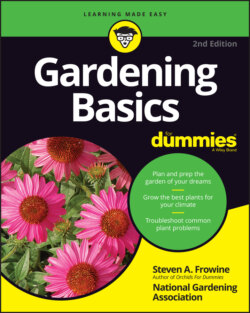Читать книгу Gardening Basics For Dummies - The Editors of the National Gardening Association, Steven A. Frowine - Страница 24
Perennial plants
ОглавлениеFor many gardeners, going from growing annuals to exploring perennials seems to be a natural progression. But remember that you don’t have to choose! You can grow both and, indeed, your garden is likely to be the better for the diversity.
So, what, exactly are perennials? One gardener jokingly defined a perennial as “A plant that, had it lived, would’ve bloomed again the next year.” For the most part, they’re long-lived herbaceous (non-woody) plants — flowers and herbs, mainly. How long they last depends on the plant and the conditions in your garden. But these plants certainly last longer than annuals.
A typical perennial emerges in the spring, grows and often produces flowers and seeds as the seasons progress from spring to summer to fall, and then slows down or dies back in winter. But the plant doesn’t actually die; it just rests. The following spring, your perennial returns in glory to repeat the cycle.
Unlike annuals, you don’t have to replant perennials every year. Once should be enough — well, if you choose wisely and take good care of your perennials, you ought to get many good years out of them.
Eventually, though, some perennials run out of steam. Their growth gets crowded and they don’t seem to flower as well. At this time, you can dig them out and replace them, or you can divide them (perhaps discarding the tired-out center, or mother plant) and replant well-rooted bits for a fresh new start.
Here are some of the many uses of perennials:
Creating a colorful bed or border
Filling an island bed (an isolated, self-contained garden, like an island in a sea of lawn)
Mixing them with annuals to assure summer-long color
Edging a walkway, patio, pool area, or deck
Interplanting them with roses, annuals, or other ornamental shrubs to provide year-round interest
Dressing up an area that was formerly lawn
For the nitty-gritty details on perennials, check out Chapter 7. If you just want the basics, read on.
